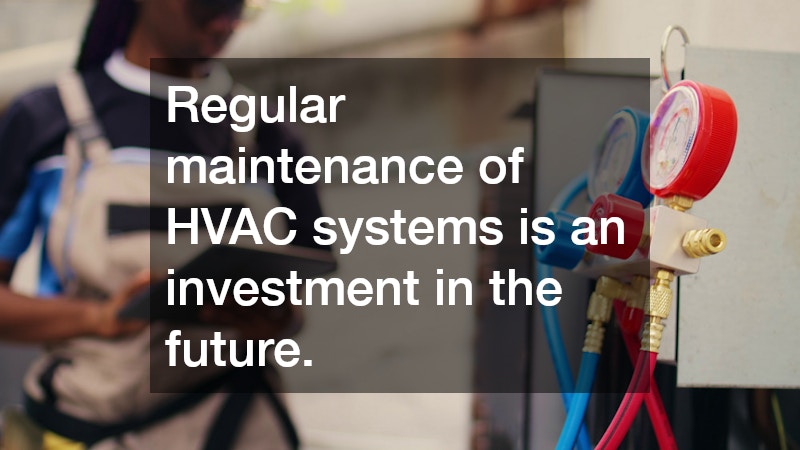How Regular Maintenance Reduces the Need for Costly Repairs
In today’s fast-paced world, homeowners and business owners alike are looking for ways to save money while ensuring their comfort. Heating, ventilation, and air conditioning (HVAC) systems are crucial for maintaining the indoor climate, but they can be costly to repair if not properly looked after. This article will explore the importance of regular maintenance and how it can reduce the need for expensive HVAC repair.
Why is HVAC Maintenance Important?
Prolonging System Longevity
Regular maintenance is essential for prolonging the lifespan of HVAC systems, ensuring they operate efficiently for years. Just as cars require regular service to function optimally, HVAC systems need periodic attention to prevent premature wear.
Components like coils and fans can become damaged over time, but regular inspections help keep them in optimal condition. Preventive maintenance can effectively double the lifespan of an HVAC unit, saving substantial future replacement costs.
By scheduling regular maintenance, homeowners can avoid the inconvenience and expense of unexpected system failures. Regular service checks help identify potential issues early, allowing for timely intervention.
Improving Energy Efficiency
The link between HVAC maintenance and energy efficiency is undeniable. A well-maintained system requires less energy to run, due to cleaned components and properly calibrated parts.
For instance, replacing or cleaning filters regularly can improve airflow, reducing the system’s workload and lowering energy consumption. This directly translates to reduced utility bills, providing immediate financial relief.
Energy efficiency is not just about saving money; it’s also about reducing the carbon footprint. By performing regular maintenance, HVAC systems can operate more cleanly, contributing to environmental sustainability.
What Maintenance Tasks Should Be Performed Regularly?
Filter Replacement and Cleaning
One of the simplest yet most effective maintenance tasks is regular filter replacement and cleaning. Filters play a crucial role in maintaining indoor air quality and ensuring the HVAC system works efficiently.
Dirty filters can lead to restricted airflow, causing the system to work harder and increasing wear on components. Experts suggest that filters be checked monthly and replaced every three months or more frequently if needed.
High-efficiency particulate air (HEPA) filters can be beneficial in capturing more airborne particles. Ensuring filters are in optimal condition can prevent costly repairs due to dust and debris buildup.
System Inspections and Tune-Ups
Regular inspections and tune-ups by professional technicians are vital for maintaining HVAC system health. During these sessions, technicians can identify and address issues before they escalate.
Critical components, such as refrigerant levels, electrical connections, and thermostat settings, are inspected and calibrated as needed. This proactive approach ensures the system runs smoothly and efficiently.
Annual inspections can uncover wear and tear that may not be apparent to homeowners. These inspections help to avoid bigger, more expensive issues and ensure peace of mind for the system’s lifespan.
How Can Neglecting Maintenance Lead to Costly Repairs?
Identifying Minor Issues Before They Escalate
Neglecting HVAC maintenance often results in minor issues escalating into major repairs. For example, a small refrigerant leak might go unnoticed and lead to compressor failure if not addressed.
Regular check-ups can catch these problems early, saving homeowners the headache and cost of larger repairs. Many homeowners report substantial savings from early intervention on small maintenance issues.
Preventive maintenance strategies are designed to protect the investment of an HVAC system. Addressing minor issues promptly can prevent them from spiraling into more significant, costly disasters.
Consequences of System Breakdown
Failure to perform routine maintenance can lead to complete system breakdowns. Such scenarios often require emergency repairs, which are both inconvenient and expensive.
For instance, fan motor failure, often a result of neglected maintenance, can cause an entire system to become inoperative. Emergency service calls are not only costly but can also involve long waiting times during peak seasons.
Unexpected system failures can disrupt both home comfort and business operations. Investing in regular maintenance significantly reduces the chance of unplanned outages and the associated costs.
Conclusion
Regular maintenance of HVAC systems is an investment in the future. By dedicating a little time and resources to routine upkeep, homeowners and businesses can enjoy efficient and reliable heating and cooling while avoiding the high costs associated with unexpected repairs. Proper maintenance not only saves money but also ensures a comfortable and sustainable living and working environment.



